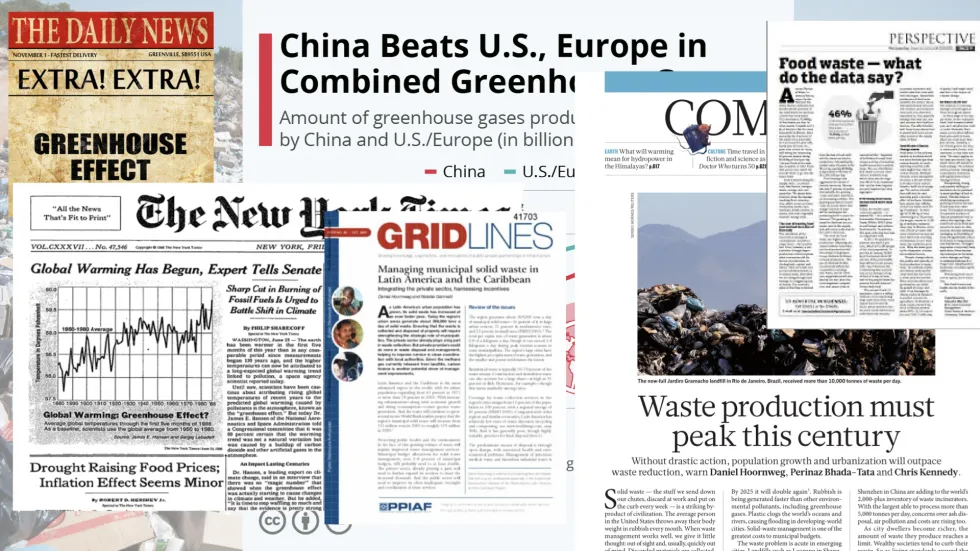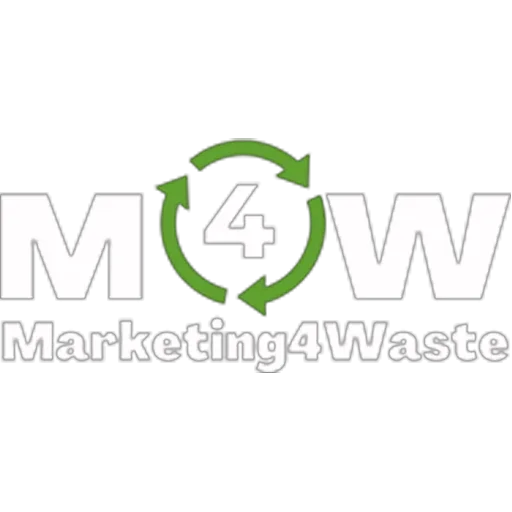Increase the Revenues of Your Waste Company With the Tips Shared in Our Blog Articles

Waste Reduction! Plastic Pollution! Greenhouse Gases!
Discover how to manage all of these problems using 6 simple principles as old as humanity.
What the hell am I saying?
This title was meant to be provocative. I know you are wondering: what are these 6 principles as old as humanity?
Before I get into these 6 principles, let me give you a quick rundown of scenarios in which these problems are present.
Over the last 70 years, the global population has increased from 2.5 billion in 1951 to 7.8 billion in 2020. This growth obviously had a significant impact on the consumption of goods, services, and products. Consequently, this has also increased waste production.
But I don’t want to go into detail about that right now.
In fact, another significant change that has occurred in the last 70 years is related to food and goods consumption. Indeed, thanks to globalization, we can buy products made in other countries or food delivered from thousands of miles away ordered using our smartphones. That is a benefit, but it is also the source of a problem.
This is because these products and foods, in order to travel around the world, require packaging that protects or preserves their quality during transportation.
Otherwise, how can you eat Pitaya in Sweden?
Let me tell you, it’s not easy.
At the same time, the increase in the number of people on our planet has resulted in another significant increase: food production and consumption. Given that 3.9 billion tons of food are produced each year and that approximately 1.3 billion tons of food are wasted globally each year, we can easily identify one of the most interesting sources of greenhouse gases (approximately 8 percent of the total).
But let me tell you where the majority of food waste comes from:
The Mass-market system: The amount of food waste is due to unsold quantities of incorrectly shipped products and high levels of food that move in trash boxes before they perish due to the log chain, from farmer to supermarket.
Local businesses: For a variety of reasons, local businesses such as bakeries, butcher shops, groceries, and local markets discard a large amount of unsold merchandise. The most common reason is that they want their displays to be full until closing time, which means they must get rid of a lot of still-fresh products at this time in order to offer fresher ones the next morning.
Households: Yes, you and I. Indeed, we account for roughly 30% of global food waste. To put it simply, we tend to eat too much, cook too much, and buy too much.
These are the main sources.
But why am I telling you this, and how does it relate to the title: Waste Reduction, Plastic Pollution, Greenhouse Gases?
In fact, I mentioned the global population growth, the need for packaging to support the globalized market, and, last but not least, food waste, because the three problems indicated in the title are caused by the three main causes that I mentioned above. Or, to put it another way, there are three major causes, but they all share an intriguing feature: humans.
Yes, we are the primary cause, but we are also the primary solution if the mainstream does not discuss solutions based on people, but rather solutions applied to people.
It’s a significant difference. Indeed, if the government decides to limit the spread of plastics, for example, by reducing their use to preserve foods, what happens is that it increases food waste and reduces the availability of some foods in some areas.
At the same time, it creates new costs to maintain the freshness of your Pitaya, such as accelerating the shipping process between the country of production and the country of sale as a result increasing greenhouse gas emission, over the costs for the product.
As you can see, it appears to be a blanket-too-short issue. But that’s because no one takes the power of the people into account. Indeed, because we created the problems, we can also solve them.
That is the critical point.
The story teaches us many examples, beginning with the ancient Roman Empire and progressing to the present day. That’s because the entire planet is based on Lavoisier Principle “Nothing Is lost, nothing is created, everything is transformed”
Only by thinking in these terms will it be possible to implement the proper waste management approach. In fact, the population will continue to grow, and waste will continue to be produced; however, by instilling a sense of responsibility in people, it will be possible to manage waste in a virtuous manner.
And to create this sense of responsibility, there are 6 principles that are as old as humanity. I’m referring to Prof. Robert Cialdini’s theory of persuasion principles.
But first, what exactly is persuasion?
Persuasion derives its meaning from the verb persuade, which means to move someone to a belief, position, or course of action through argument, entreaty, or expostulation. As you can see, persuasion refers to the ability to persuade people to take action through the use of arguments.
Now that you understand what persuasion is, let me explain why I’m bringing it up.
In 1984 Prof. Robert Cialdini published his book “Influence: The Psychology of Persuasion” where he explores factors that affect the decisions that people make, particularly in relation to sales and purchasing.
At the core of Cialdini’s work is the idea that decision making is difficult, so people use a variety of rules of thumb and decision making shortcuts (heuristics) when deciding what to do, how to behave, or what action to take in any situation. Cialdini identified 6 core principles that influence these decision making shortcuts, particularly in purchasing and consumption decisions.
The main message he conveys is that if you understand these 6 principles, you can use them to your advantage when trying to persuade others to do something or buy something.
I know you’re thinking, “Waste is a problem, not a product or service to sell.” Indeed, you are right, but I am confident that a waste management company can use the 6 Cialdini principles to persuade people to take more responsibility for waste management.
But if I explain the 6 principles to you, you’ll quickly understand why I’m saying that.
The first of the 6 principles is Reciprocity.
To a certain extent, people value equality and balance. This means that people dislike feeling as if they owe other people something. When people have these social obligations they try to settle them. It is possible to use this desire for reciprocity to influence the behavior of others.
To accomplish this, you must be the first to act and present someone with a unique and unexpected gift. To some extent, the value of the gift is less important than the act of giving itself.
But how would it work in waste management?
As an example, you could send a letter to all citizens in your country, city, or neighborhood containing a keychain obtained through the recycling of empty cans and promoting an empty can collection campaign.
If you collect paper, you could send a paper notebook made entirely of recycled paper along with a letter encouraging paper segregation and offering the possibility of giving 300 paper notebooks to local schools every two months.
The second principle is Scarcity
People tend to want something more when there is less of it.
This holds true for both experience as well as for material products.
From a persuasion and influence perspective this means that to increase interest in your product or service, you may benefit from reducing its availability (or at least creating a sense of scarcity).
Is it possible to apply this principle easily in terms of waste management?
The answer is yes.
In fact, if you tell people that your plant, for example, can only process 50 metric tons of plastic per month and offer $1 for each kilogram of plastic disposed off directly at your plant, you’ll see the results.
The third principle is Authority
Individuals who are authoritative, credible and knowledgeable experts in their fields are more influential and persuasive than those who are not. Part of the reason for this is that authority and credibility are some of the core building blocks of trust. When we trust people we are more likely to follow them.
For that reason doctors, lawyers and others display certificates of their titles in their offices.
How does that apply to waste management?
Remember, we live in the age of social media. You can easily build your waste management company’s reputation in this manner, but you can also easily destroy it.
For that reason you need to use PR to build a strong Authority. For example, you could give an interview to a local newspaper or radio station about the problem of waste and how your company is solving it or offering a different solution than the solution proposed until a certain date.
You could write a book about the specific problem caused by the dispersion of the waste that you collect and how it can harm the environment, even if the community is using ineffective solutions in comparison to your solution.
The fourth principle is Commitment and Consistency
People prefer consistency in their identity or sense of self-image.
For example, if I consider myself to be a “healthy” person, I am more likely to engage in “healthy” behaviors such as eating non-processed foods and exercising in the morning.
This means that if I can persuade you to act in a particular way in relation to something, you’ll think of yourself as that type of person and be more likely to act in that way again in the future. If I suggest it, you’ll be more likely to increase your actions in that direction.
To some extent, we can think of this as a salami-slicing tactic for persuasion.
If I can get you to do one small thing, I can get you to do another small thing that is similar. Then you’ll do a bigger one. And then, before you know it, you’ve devoured the entire salami.
What role does it play in waste management?
As an example, you could involve the neighborhood in the cleaning of the green areas by organizing an event in which everyone who participated would receive a certificate as a community supporter at the end of the day. During the certificate distribution, you will ask who among the participants would like to contribute continuously to the neighborhood’s environment, and you will invite them to give their names.
They will commit because you have given them the opportunity and you are committed to working with them.
The fifth principle is Liking
It may seem obvious, but people are far more likely to be influenced and persuaded by those they like than by those they dislike. People are far more likely to like people who pay them compliments and cooperate with them than those who do not. And, unfortunately, despite positive evidence for some of the benefits of diversity, people are much more likely to like people who are similar to them than those who are not.
It may appear strange, but it works in waste management as well.
For that reason, it is important that you and your company embody the service model that people expect. It is important to conduct research on what people are looking for through surveys in order to create this model.
They will buy from you and assist you if they like you and your service.
The sixth principle is Consensus, or Social Proof
Humans are social creatures by nature, and they generally believe that conforming to the norms of a social group is important. This means that when it comes to making decisions, we frequently look around to see what others are doing before making our own.
This last one, in particular, appeals to me.
It actually helps a lot with waste management, especially when you work on something that involves the residents of the neighborhood; in fact, people recycle more when their neighbors recycle more. And it is very simple to apply this principle to encourage more waste segregation, better segregation, more collection, and whatever else you want by forming some small groups that begin to collaborate.
As you can see, these 6 principles can have a significant impact on waste management and human behavior in order to help humanity because they act directly on our “coding language.”
For that reason, as a waste manager or owner of a waste management company, you should use that as the foundation of your marketing strategy to solve the problems mentioned in the title..
That is the only option.
In fact, as history has shown, the other systems are only palliative.
Terrorism in the media instills fear rather than providing solutions.
We need solutions if we love our planet.
Not fear.
In fact, I’m sure when your mother told you as a child, “don’t touch the oven because it’s hot!” you weren’t scared and so you touched. When your hand burned, you cried in pain as you realized that the only way to touch it was with a protective glove.
It’s the same here.
But why not use the same 6 principles to persuade people to become responsible in waste management?
In fact, it’s about selling the importance of being responsible about waste.
And believe me it’s easier than all the utopist ideas that are currently spreading.
Want to learn more about the 6 principles, click here


© 2025 Marketing4waste - All Rights Reserved,
Marketing4Waste is a brand of MiM MarketingInterimManagers LLC
+1 801 804 5730

